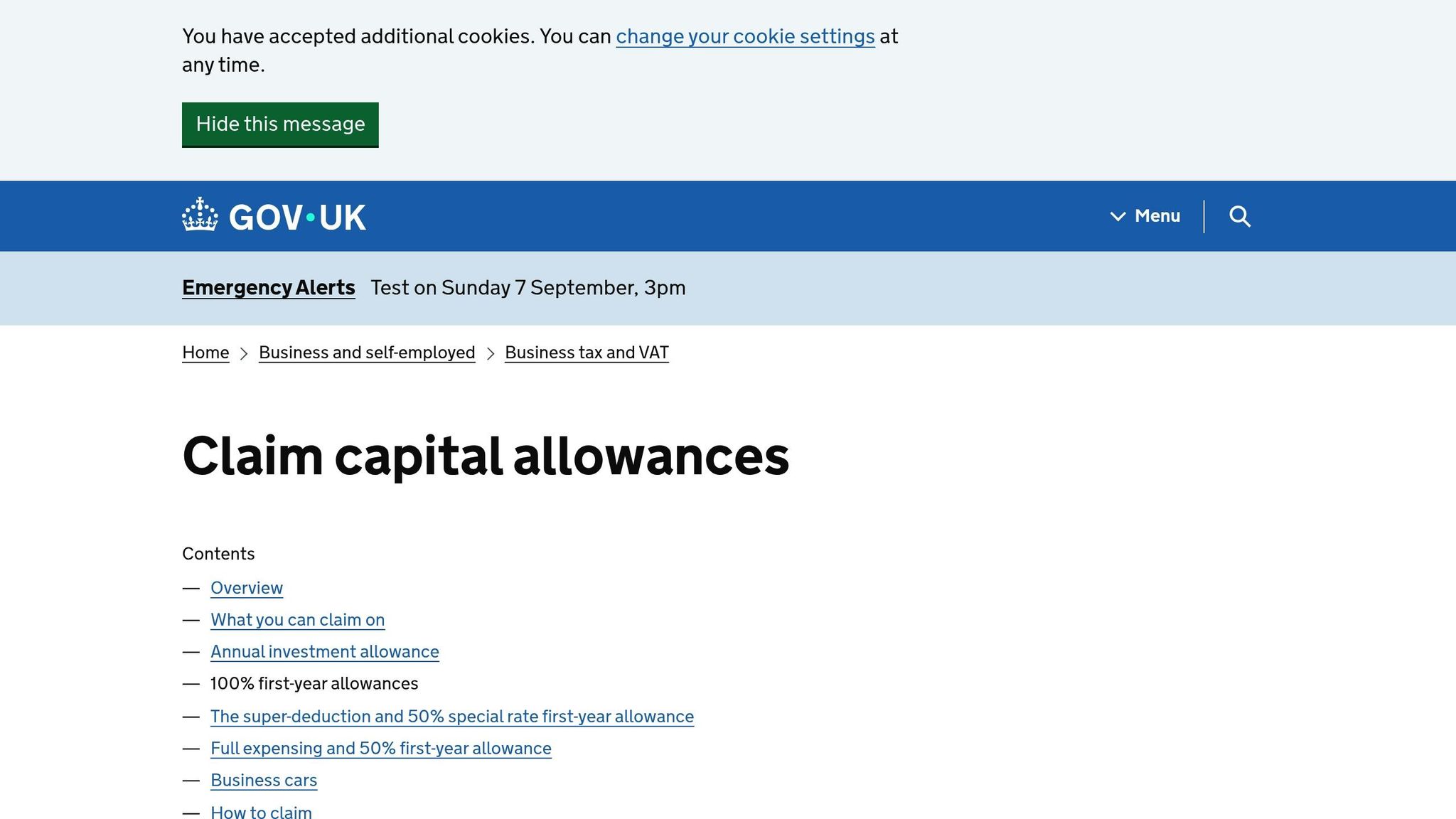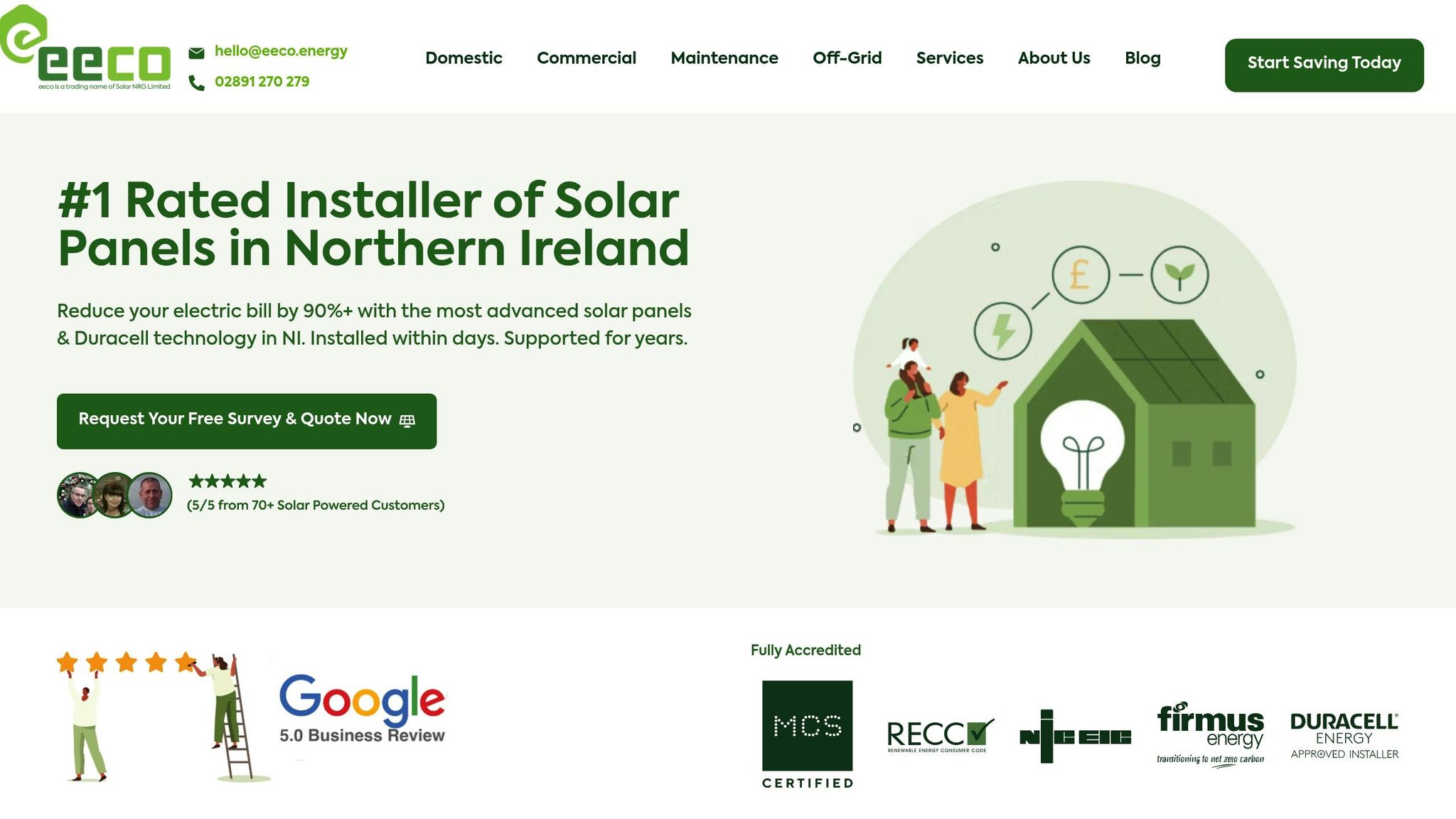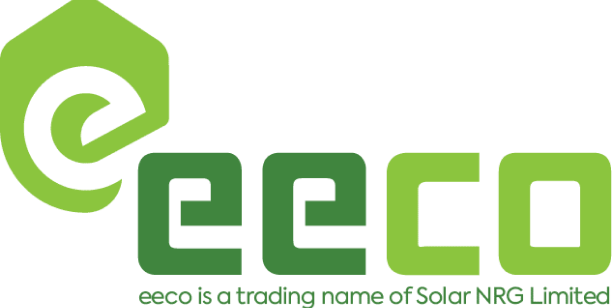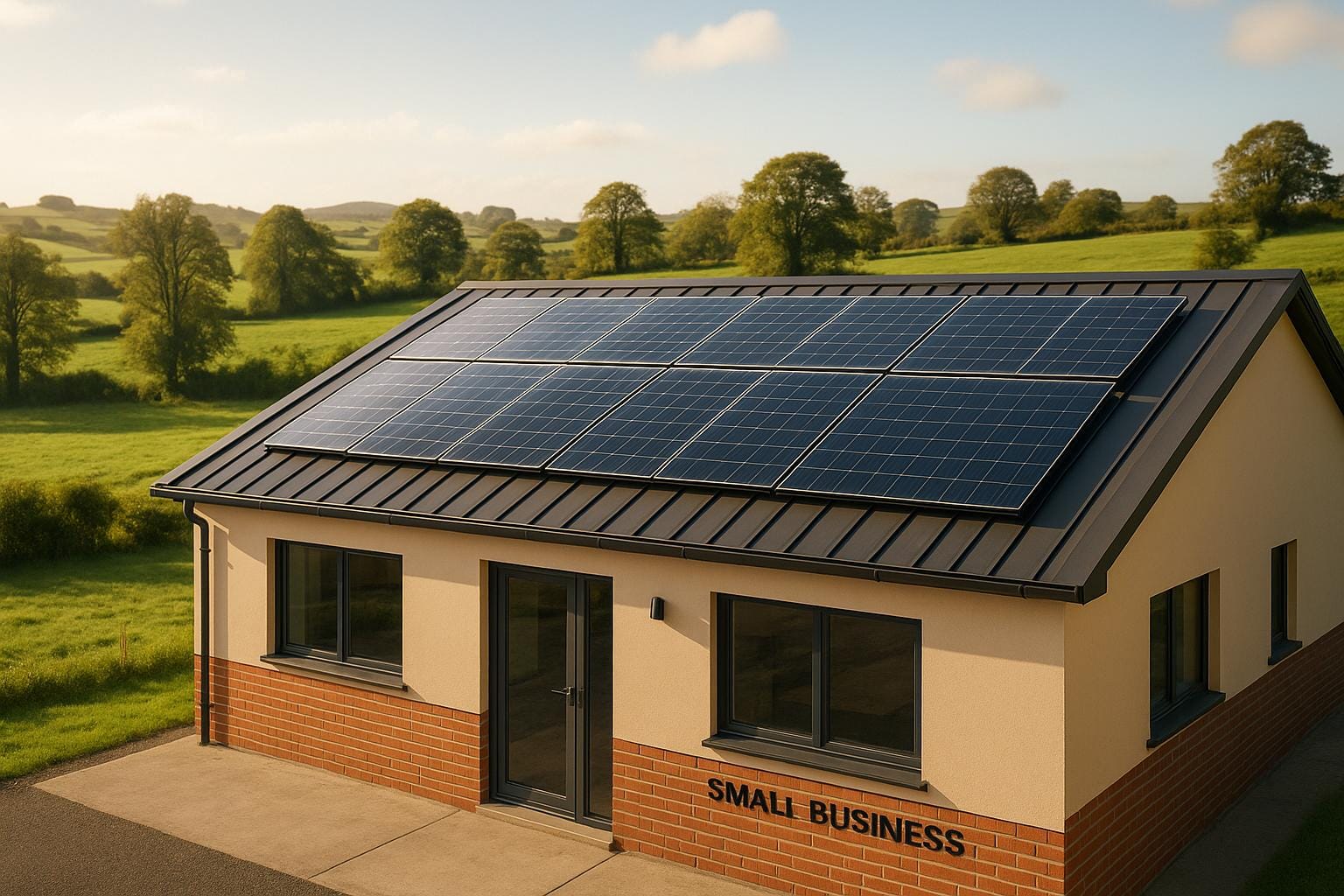Small businesses in Northern Ireland can save money and reduce reliance on the grid by switching to solar energy. While VAT relief for commercial solar systems is unavailable, SMEs can still benefit from grants like NISEP, tax savings through Enhanced Capital Allowances, and battery storage options to maximise their energy efficiency.
Key Points:
- Cost Savings: Solar panels lower electricity bills and protect against rising energy prices.
- NISEP Grants: Covers up to 20% of installation costs (apply via approved installers).
- Tax Relief: Enhanced Capital Allowances allow 100% first-year claims on qualifying equipment.
- Battery Storage: Options like Duracell systems help store surplus energy for later use.
- Installation Costs: Systems start at £3,950 for a 4.5kW setup, with larger systems offering better value.
Switching to solar energy is a practical move for SMEs seeking long-term savings and energy independence.
Solar Grant and Incentive Schemes for SMEs
Small businesses in Northern Ireland have access to several financial support schemes aimed at reducing the upfront costs of renewable energy systems like solar panels.
0% VAT on Solar Installations
Unfortunately, the 0% VAT policy does not extend to commercial solar systems for SMEs. For example, a solar system costing £10,000 would still incur an additional £2,000 in VAT under the current rules.
Interestingly, industry data reveals that solar installation rates in Northern Ireland jumped by 35% within six months of the VAT removal for residential properties. For eligible properties, the 0% VAT rate remains in place until 31 March 2027. After this date, it will revert to a reduced rate of 5% VAT.
While VAT exemptions for SMEs are not available, there are other financial incentives worth exploring.
Other Support: Enhanced Capital Allowances

The Enhanced Capital Allowances scheme provides another way for businesses to save. Under this scheme, companies can claim 100% first-year capital allowances on qualifying energy-saving equipment, including solar panels. This means businesses can significantly reduce their first-year corporation tax, improving their financial return on investment.
How to Adopt Solar Energy for SMEs
Switching to solar energy can be a smart move for small and medium-sized enterprises (SMEs), especially with grant schemes available to ease the cost. However, making the transition requires careful planning. To get the most out of these opportunities, you’ll need to ensure your business premises are suitable for solar installations, navigate the grant application process, and select a qualified installer who meets the necessary standards, such as those set by NISEP and the Microgeneration Certification Scheme (MCS).
Assessing Premises Suitability
The first step is to determine whether your premises are appropriate for a solar installation. This involves checking a few key factors:
- Roof condition: Is your roof structurally sound and capable of supporting solar panels?
- Orientation and space: Does your roof have the right orientation and enough unobstructed area for panels to capture sunlight efficiently?
- Energy needs: Review your current energy usage to estimate how much you could save or offset by generating your own solar power.
By addressing these points, you can establish whether solar energy is a practical option for your business.
Applying for Grants and Incentives
For SMEs in Northern Ireland, the Northern Ireland Sustainable Energy Programme (NISEP) offers grants covering up to 20% of the cost of installing solar PV systems. To benefit from this programme, follow these steps:
- Register your interest: This is typically done through approved energy providers such as Power NI or Solar Power NI.
- Wait for approval: Do not start any installation work until you’ve received formal grant approval. Starting early could disqualify you from receiving funding.
- Use approved suppliers: Ensure your installer complies with NISEP requirements, including the use of approved equipment and adherence to specified procedures.
Beyond NISEP, SMEs can explore additional support options. For example, the Business Support Finder by Invest Northern Ireland offers guidance on various schemes. The Enhanced Capital Allowances scheme also allows businesses to claim 100% first-year capital allowances on qualifying solar equipment, providing further financial relief.
Choosing an Accredited Installer
Selecting the right installer is crucial for a successful solar installation. Look for professionals accredited by schemes like the Microgeneration Certification Scheme (MCS). This ensures they meet the high standards required for compliance with NISEP.
When choosing an installer, consider the following:
- Compare quotes: Look at system specifications, pricing, warranties, and aftercare services.
- Local expertise: Work with an installer familiar with Northern Ireland’s planning regulations and grid connection requirements to avoid potential delays.
EECO Energy: Solar Solutions for Small Businesses in Northern Ireland

When it comes to finding the right solar installer for your small business, EECO Energy stands out as a local expert. With a deep understanding of Northern Ireland’s specific energy needs, they provide customised solutions aimed at helping SMEs lower energy costs and work towards energy independence.
EECO Energy’s Services Overview
EECO Energy offers a comprehensive suite of solar services, including PV installations, battery storage, EV charging points, and maintenance. By covering a wide range of energy needs, they make it easier for small businesses to transition to renewable energy with a single provider.
They also cater to more specialised requirements with off-grid and solar thermal systems, as well as smart immersion controllers and energy-efficient radiators. These options are ideal for rural businesses or those with unique heating demands.
As an approved installer of Duracell battery systems, EECO Energy brings a high level of technical expertise to its projects. This partnership ensures businesses receive reliable, high-quality storage solutions that integrate seamlessly with their solar installations.
Key Features and Benefits for SMEs
EECO Energy holds MCS accreditation, a critical certification for accessing grants like NISEP. This accreditation guarantees that their installations meet the strict standards required for government funding, giving business owners confidence in their investment.
To make the process even more accessible, the company offers free surveys and quotes, helping SMEs assess their solar potential without any upfront commitment. Their one-day installation service is designed to minimise disruption, which is especially valuable for small businesses that can’t afford extended downtime.
Every installation comes with a 25-year warranty, offering long-term reassurance about the quality and durability of the system. This extended warranty reflects EECO Energy’s confidence in their work and ensures peace of mind for business owners.
With coverage across Northern Ireland, EECO Energy provides fast response times for maintenance and support. Their local knowledge also ensures smooth navigation of regional planning rules and grid connection processes.
These features, combined with transparent pricing options, make EECO Energy a solid choice for SMEs with diverse energy needs.
Pricing Examples and System Sizes
The table below highlights system sizes, energy outputs, and pricing, based on optimal south-facing roof conditions. EECO Energy offers tailored solar systems to meet varying business energy demands, with clear pricing that helps SMEs plan their investments effectively. Their systems range from smaller 4.5kW setups for lower energy users to larger 9kW systems for businesses with higher consumption needs.
| System Size | Number of Panels | Annual Output (kWh) | Price |
|---|---|---|---|
| 4.5kW | 10 | 3,380 | £3,950 |
| 5.4kW | 12 | 4,400 | £4,350 |
| 7.2kW | 16 | 6,189 | £4,850 |
| 8.1kW | 18 | 6,685 | £5,700 |
| 9kW | 20 | 7,099 | £5,900 |
Larger systems offer better value per kW, making them an attractive option for businesses with higher energy requirements.
For battery storage, EECO Energy provides three main options to pair with solar installations:
- Dyness 10kW battery: £2,400 – a cost-effective entry-level solution.
- Soluna 10kW battery: £3,000 – a mid-range option offering balanced performance.
- Duracell 10kW battery: £3,650 – a premium choice backed by the trusted Duracell brand.
These batteries allow businesses to store excess solar energy for later use, such as during peak demand times or at night. This not only maximises savings but also enhances energy security, ensuring businesses can rely on their solar systems regardless of weather or time of day.
sbb-itb-d2d975a
Grant Schemes and Cost Savings Comparison for SMEs
Small and medium-sized enterprises (SMEs) in Northern Ireland have several opportunities to cut the costs of solar installations. By tapping into grants, tax relief, and VAT exemptions, businesses can significantly improve their payback periods.
Grant Schemes Comparison
Northern Ireland offers three key schemes to help businesses lower the cost of solar installations:
| Scheme | Coverage | Eligibility Criteria | Application Process | Processing Time |
|---|---|---|---|---|
| NISEP | Provides direct cash support for solar installations | Specific business requirements apply | Must apply through an accredited installer (e.g., EECO Energy) | Takes several weeks |
| 0% VAT on Installations | Exempts solar installations from VAT | Applies to designated installations | Automatically applied at the time of purchase | Immediate |
| Enhanced Capital Allowances | Offers tax relief on installation costs | Available to eligible UK businesses | Claimed through the annual tax return | Applies in the next tax cycle |
Each scheme brings unique benefits, and SMEs should carefully review eligibility criteria and deadlines to maximise their financial advantages. By combining these schemes, businesses can see even greater financial returns on their solar investments.
Cost Savings and Payback Periods
When these schemes are combined, the financial benefits of solar installations become even more apparent. While savings and payback periods depend on factors like system size, energy usage, and local conditions, here’s how businesses can benefit:
- Lower upfront costs: Grants, VAT relief, and tax savings through Enhanced Capital Allowances reduce the initial financial burden.
- Energy storage advantages: Pairing solar systems with battery storage allows businesses to store surplus energy for use during peak demand, further cutting energy costs.
To get the most accurate picture of potential savings, SMEs should carry out a detailed financial analysis. This should account for factors such as electricity rates, roof orientation, and energy demand. A tailored approach ensures businesses can determine their specific payback period and annual cost savings.
Conclusion
Small businesses in Northern Ireland have a fantastic opportunity to cut their operating costs by switching to solar energy. Thanks to government support schemes like the NISEP grants, 0% VAT on installations, and Enhanced Capital Allowances, the financial benefits of going solar are hard to ignore.
By combining these incentives, businesses can significantly reduce upfront expenses while reaping long-term savings. Adding battery storage systems into the mix makes this option even more appealing, as it allows businesses to store unused energy and tap into it during peak times when electricity rates are at their highest.
EECO Energy makes the transition to solar energy straightforward for businesses in Northern Ireland. Their tailored, scalable solar solutions are designed to meet the unique energy needs of SMEs, offering the flexibility to suit different operational demands.
With energy prices climbing and government schemes actively promoting renewable energy, now is the perfect time for SMEs to make the switch. The combination of immediate VAT relief, grant funding, and ongoing savings on energy costs provides a solid financial incentive for businesses ready to embrace solar energy.
For small businesses looking to take charge of their energy expenses while reducing their environmental impact, solar energy isn’t just an eco-friendly option — it’s a smart business move with tangible financial benefits that will last for years.
FAQs
How can small businesses in Northern Ireland assess if their property is suitable for solar panels?
To figure out if your property is a good fit for solar panels, start by looking at a few key aspects: roof space, the condition of your roof, its orientation, and whether there’s shading from nearby trees or buildings. Ideally, a south-facing roof with little to no obstructions is best for generating the most solar energy.
You’ll also need to arrange a professional site survey. This is crucial for checking the structural soundness of your roof and understanding any planning permissions or legal requirements that apply in Northern Ireland. This step ensures your property is safe and meets all necessary regulations for installing solar panels.
By following these steps, small businesses can make well-informed choices and lay the groundwork for successfully adopting solar energy.
What steps can small businesses in Northern Ireland take to maximise savings with solar energy?
Small businesses in Northern Ireland have a fantastic opportunity to cut costs and embrace renewable energy by taking advantage of various grants and funding programmes designed for solar energy. For instance, the Northern Ireland Sustainable Energy Programme (NISEP) offers financial aid to support the installation of renewable energy systems, making the initial investment more manageable. Additionally, the Energy Efficiency Capital Grant (EECG) provides funding aimed at improving energy efficiency, which can help lower operational costs.
When these financial incentives are paired with smart energy management plans and properly sized solar installations, businesses can enjoy noticeable reductions in their energy bills, shrink their carbon footprint, and move closer to achieving long-term energy self-sufficiency.
What is the difference between the NISEP grant and Enhanced Capital Allowances for solar installations, and how can small businesses apply?
The NISEP grant (Northern Ireland Sustainable Energy Programme) offers financial support for businesses looking to adopt energy-saving technologies like solar PV. It covers around 20% of installation costs, making it a practical choice for those aiming to cut energy expenses. To apply, businesses must meet the eligibility requirements and complete an online application, which usually involves submitting the necessary documentation.
The Enhanced Capital Allowances (ECA) scheme provides another incentive by allowing businesses to claim 100% of the cost of solar installations as first-year tax relief. This helps reduce taxable profits, offering an immediate financial advantage. To qualify, the equipment must be owned by the business, used for business purposes, and the claim should be made through the company’s tax return.
Both initiatives are designed to make solar energy more affordable for businesses in Northern Ireland, helping them save on energy bills while contributing to a greener future.


